There was no bloodshed ...
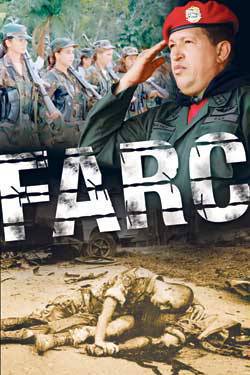 But the reasons that gave rise to the conflict between Caracas and Bogotá remain
But the reasons that gave rise to the conflict between Caracas and Bogotá remainRelations between Venezuela and Colombia have long been in a state of permanent tension. At times it seemed that it would develop into a war between two neighboring Latin American states. So, on July 22 of this year, the Venezuelan president Hugo Chavez announced the severance of diplomatic relations with Bogotá and gave the command to pull troops to the Colombian border. Something similar happened in early March 2008, when he ordered to be nominated to the border region. Tanks...
Let us try to consider a combination of factors and causes that are intertwined in a tight knot and determined the situation.
Wrestlers for fairness or bandits?
For nearly half a century, Colombia has been in a state of civil war. It erupted in the remote mountainous areas of the country where the partisan movement originated. Gradually, scattered detachments of the rebels united in the militarypolitical organizations. The most influential of these is the Revolutionary Armed Forces of Colombia (FARC). Once its number reached 15-20 thousands of people, the leader was a native of the Communist Party, Manuel Marulanda. The other is called the National Liberation Army (ELN). This group leftist sense. There are about 5 thousand people in it, the leader is Nelson Rodriguez.
FARC and ELN have announced that they will lead an implacable struggle against the bourgeois state to build a society of social justice. At the start of the 2000s, both the Revolutionary Armed Forces and the National Liberation Army launched active hostilities in the 600 territory of the 1907 municipalities, approximately 200 of which were actually controlled by the partisans.
To achieve their goals, they used and used all possible and impossible means: the explosions of oil pipelines and power lines, hijacking aircraft, killing policemen, soldiers and officers, taking hostages (including in churches), attacking civilians and government agencies.
Gradually, political demands faded into the background, the criminalization of the armed formations took place. Their top is now firmly connected with the drug mafia, fed by it, has significant dividends from the criminal business. The leaders have superbly settled in the mountains, they fatten, they use the newest means of communication, the Internet (they have created their own websites where official documents and propaganda materials are placed), they keep their representatives abroad. In the past, Cuba provided considerable moral and material support to the rebels, their leaders regularly visited Havana, stayed there for a long time, and all sorts of publicity were arranged for them.
Meanwhile, ordinary soldiers are experiencing all the harsh harsh camp life. Luring vocal propaganda slogans and various promises of young men and women from poor families, the heads of the FARC and ELN cynically use them as cannon fodder for their own selfish interests.
TIGHTING NEGOTIATION PROCESS
To resolve the internal armed conflict, the Colombian authorities have used both force and political methods. President Andres Pastrana (1998-2002 years), who personally met with Marulanda, showed maximum readiness for dialogue. The result of this meeting was the decision to demilitarize five municipalities. As a gesture of goodwill, the head of state even traveled to Europe with prominent partisan commander Raoul Reyes.
In order to end civil strife, the so-called Colombia Plan, a ten-point comprehensive strategy, was developed in 1999. It included strengthening state structures, creating conditions for establishing lasting peace, controlling crops of drug-containing crops, combating drug trafficking and solving social problems. The fact is that the cultivation of coca is very profitable for small producers, since they derive from this quite good incomes, which allow not only to make ends meet, but also sometimes lead a quite tolerable existence.
The financial support for the plan was 7,5 billion dollars. Bogota allocated for these purposes 4 billion, the remaining funds she intended to receive from the United States and the European Union. But in practice, the measures taken by the government gave minimal results. No progress was made in the peaceful resolution of the conflict. Demilitarized zones were used by partisans to train new recruits, prepare regular actions, trade weapons and drugs. The failure of 2002 in February due to the guilt of the rebel negotiations led to a sharp change in public sentiment and, accordingly, to the consolidation of the position of supporters of tough measures against the "revolutionaries".
That’s what the 49-year-old independent presidential candidate, Alvaro Uribe, advocated. His election victory, held on 25 on May 2002, was predictable. As most analysts predicted, the second round was not needed. The new head of state, who challenged the traditional parties and was advanced by the “Colombia - first of all” movement, believed that success could be achieved only with the help of force, and therefore funding for the professional army and law enforcement agencies, in particular, the police, significantly increased their number.
The merit of Uribe was the curbing of the activities of illegal right-wing armed groups, put together as a counterweight to the partisan groups in the context of the demoralization of the central government. Once in these formations, known as the United Self-Defense of Colombia (AUC), there were 14 thousands of militants. Many of them were also associated with the drug mafia and in turn contributed to the destabilization of the situation. In addition, the president managed to implement a number of social programs aimed at reducing poverty and creating new jobs.
On this wave, Uribe achieved an amendment to the Colombian constitution allowing the president to be elected for a second term, put forward his candidacy in the next elections in 2006 and won the right to remain at his post until the 2010 year. Earlier, in May 2005, he launched an initiative to grant amnesty to insurgents who are ready to join the peace process, regardless of the crimes committed. At the same time, Uribe believed that the resumption of negotiations with the partisans was possible only if they stopped terrorist acts and took hostages. The rebels insisted that the withdrawal of troops and police from two departments should be a condition for starting negotiations on the release of the prisoners in their hands. To achieve mutual understanding, the government was sometimes forced to resort to the services of intermediaries.
Toward the close of 2007, the Venezuelan President acted in this role, having previously obtained the consent of a Colombian colleague. Uribe reluctantly accepted this, because he knew well that Chavez, who himself had once tried to take power by force, clearly sympathized with the Colombian partisans. They answered him in return. For a number of years, Venezuela provided its militants from a neighboring country with its territory for the treatment and creation of recreation centers. Nevertheless, Uribe decided on such an extraordinary step.
The peacekeeping mission of Chávez was crowned with success. In early January, 2008, the rebels took hostage - Clara Rojas and Consuelo González, who spent six years in prison. Later four more politicians joined them. It seemed the process was underway. However, after the Venezuelan leader categorically rejected the wording relating the rebels to terrorist organizations, the Colombian authorities refused his mediation services. A scandal broke out. Chavez called Uribe a mafia element, threatening to break off diplomatic relations and curtail economic ties with Colombia.
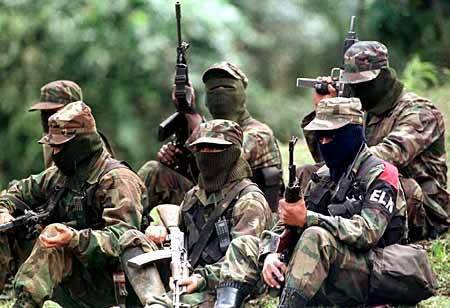
IN A STEP FROM WAR
1 March 2008, the Andean subregion was on the brink of war with Colombia, Ecuador and Venezuela. The reason for the conflict was the elimination of the Colombian special forces on the adjacent Ecuadorian territory of a prominent field commander Raul Reis and, according to various estimates, from the FARC fighters 16 to 20.
A scandal broke out. Ecuador accused Colombia of violating national sovereignty, recalled its diplomats from Bogota and filed a complaint with the Organization of American States. In turn, Venezuela, which was not directly related to the incident, took similar steps and, in addition, advanced ten tank battalions to the borders with Colombia. Large-scale armed clashes loomed.
The murder of a partisan leader in the territory of Ecuador, which did not directly affect Venezuela, nevertheless led to a sharp exacerbation of relations between Bogota and Caracas. Chavez, who harbored a grievance in Uriba, instantly and quite peculiarly reacted to the Colombian operation in Ecuador: he simply began to unleash the conflict, throwing logs into the flaming fire.
In addition to saber-rattling, the Venezuelan leader made some tough statements. In particular, the vis-à-vis warned: “If you, President Uribe, try to do with Venezuela what you have arranged in Ecuador, I will send several“ Dry ”against Colombia. All this is very serious and can mark the beginning of the war in Latin America. Surely many people in Colombia want to get rid of their government, so we have to liberate this country. ” Blaming the Colombian president for violating the sovereignty of Ecuador, Chavez made it clear that he was ready to contribute to the overthrow of the legitimate government in Bogota.
Since the beginning of the conflict, political leaders from various countries of the continent have tried to contribute to its resolution. Began to use such a proven resource as high-level diplomacy.
At the end of the first week of March, the situation was defused. First, a session was held of the oldest regional structure - the Organization of American States, which promptly held an emergency meeting. Then came the summit of the so-called Rio Group, which met on March 7 in the capital of the Dominican Republic with the participation of representatives from Latin American 20 countries, including the presidents of Ecuador, Venezuela and Colombia. At this moment, a very positive role was played by the hospitable host, who managed to seat all the participants at the same table. Outwardly, a very benevolent atmosphere reigned there. This gave the correspondent of one of the British television channels a reason to give an impressive headline to the report on the events - “City of the World”.
The tripartite conflict, which did not grow into a war, largely due to the activity of the Latin American community, was initially rife with paradoxes. We have already noted the inadequate reaction of the Venezuelan leadership to it, which instantly withdrew the diplomatic staff of the embassy from the capital of Colombia, and also ordered the curtailment of intensive economic ties with the neighboring country, which reached significant volumes of trade and mutual capital investments. After a few days everything returned to normal. The presidents of the two countries embraced in public, thereby emphasizing that everything, they say, is over.
By the way, Uribe immediately called the Ecuadorian counterpart Rafael Correa after the incident and expressed regret over the incident. In turn, the Minister of Defense of Colombia apologized for the invasion of the territory of Ecuador.
US FACTOR
The Venezuelan president intent on using ever-present tensions to use as a convenient pretext for creating a military alliance of countries belonging to the Bolivarian Alliance, in order to repel the “aggressive designs” of the Colombian elite, behind which stands “American imperialism”. He spoke directly about this at the beginning of 2008.
Such an inadequate response to the situation, an increased excitability and nervousness of Chávez were due to at least three factors. First, the different types of political regimes in Colombia and Venezuela. If the leadership of the former adheres to a model of open market economy, a pluralistic democracy, retains the freedom of the media, the Venezuelan president favors building the so-called socialism of the 21st century and is trying to impose it on the rest of the continent. Secondly, the proximity or coincidence of the ideological positions of the leaders of Venezuela and Ecuador. Thirdly, the strategic partnership of Washington and Bogota, while Venezuela and the United States are developing, to put it mildly, very difficult relations.
Colombia is the only strategic ally of the United States in South America. Only Washington has allocated billion dollars to 1,3 for the implementation of the Columbia Plan. In total, in recent years, the United States has provided Bogota with more than 5 billion dollars through various channels. These funds are designed to carry out not only civilian but also military aspects of a peacekeeping strategy. In terms of American injections, Colombia ranks second in the world after Israel.
This support is conditioned by the need to combat terrorism and drug trafficking. President Uribe regularly visited Washington, he developed a relationship of trust with the former White House owner, George W. Bush.
In light of this, the statement made by the representative of the US administration became clear. He called Chávez’s statement “an inadequate response to the actions of the Colombians against the terrorist organization that is holding hostage the Colombians and the Americans.” The logic of the White House was as follows. Since the guerrillas freely penetrate the border, thereby committing illegal acts, similar response measures are fully justified. About this, in particular, bluntly said Secretary of State Condoleezza Rice.
At the peak of a sharp aggravation of the situation in the international community, the question of the hypothetical participation of the United States in hostilities in the event of a conflict escalating into a hot phase was seriously debated. However, Pentagon chief Robert Gates dismissed such an opportunity, saying that "there is no need to help the Colombians, they may well stand up for themselves."
Washington’s unconditional support for all the actions and steps of the Colombian authorities, without exception, is sharply discordant against the background of incessant confrontation with Venezuelan President Chávez. Without going into the details of this problem, we confine ourselves to only one important consideration. While the United States and most European countries finally recognized the FARC and ELN as terrorist organizations, the Venezuelan leader, on the contrary, continues to regard members of the formations as ardent revolutionaries fighting for the bright ideals of liberation from the yoke of capitalism. This circumstance served as an additional source of tension. The reason for the next round of exacerbation of bilateral relations was the consent of the Colombian government to provide the Americans with additional military bases to step up the fight against drug trafficking and drug trafficking. This step was clearly viewed as hostile towards Venezuela.
FULLY EXPLAINABLE CHANGES
It is noteworthy that before arriving in the Dominican Republic there were signs that the Venezuelan president was ready to back up. He made a sensational statement - called on the rebels to change their methods of action and move on to parliamentary methods of struggle for power. Later, namely, 8 June 2008, after the release of information about the death of the FARC leader Marulanda, Chavez made no less sensational confession: “The guerrilla war went to history. At the moment, there is no place for partisan wars in Latin America. ”
The hope for the possibility of resolving a purely internal conflict in Colombia was inspired by a letter from the Venezuelan president to the new FARC leader Kano, which contained such a passage: “I think it’s time to release all the hostages you have without asking for anything in return. It will be a great humane gesture. ”
These words sounded like a bolt from the blue, had the effect of a bomb exploded. After all, the fact that Chavez sympathized with the partisans, provided them with moral and material support, is an open secret. And such a metamorphosis! It, perhaps, can be explained by the fact that the hard drives of the computer of the murdered partisan leader Raul Reyes revealed information about the involvement of the Venezuelan government in financing the militants (300 million dollars) and the supply of weapons.
The discs were transferred to Interpol for inspection. Examination confirmed their authenticity. Of course, Chavez did not fail to call it clowning, but still he became slightly quiet, thus sending a clear signal to the Colombian authorities - look, we are no longer indulging your enemies. The reason is that the Colombian authorities, based on the findings, could file a complaint with international legal authorities about Venezuelan interference in internal affairs. It is clear that Chavez was not at all interested in this.
It is appropriate to add to this that most recently, a number of sensitive blows were inflicted on the FARC, which gave rise to a number of authoritative observers talking about the crisis and even the imminent disintegration of a group that had long held solely on the authority of the late Marulanda. Now this assessment is shared by many. For example, Pablo Casas, an analyst at the Center for Democracy and Security in Bogota, stated categorically: “FARC reminds of a slowly dying giant. This is the beginning of the end ... I do not see any factors that they could use to preserve their structure. It is already beginning to crumble, and there is no turning back. ”
IS LIGHT SEEN AT THE END OF A TUNNEL?
22 July this year, the bilateral conflict has escalated again. The reason was the statement by the head of the Colombian Foreign Ministry at a meeting of the OAS that thousands of members of insurgent groups who had raided Colombia from there were taken refuge in Venezuela. In the proof were presented photo and video materials. Hugo Chavez responded instantly: he called the materials fake, announced the severance of diplomatic relations, gave the command to bring the troops into full combat readiness. Along the way, he announced his intention to stop oil supplies to the United States. All this happened two weeks before the completion of the eight-year mandate of President Uribe.
On Saturday, August 7, Juan Manuel Santos, elected on June 22 by universal suffrage, took office as head of state. He promised to continue the implementation of the “democratic security” policy formulated by the predecessor. Of course, the Venezuelan leader was not present at the inauguration. True, at a crowded rally in Caracas, he announced his desire to normalize relations with the neighboring country.
Directed by the inauguration ceremony, Foreign Minister Nicolas Maduro had a lengthy conversation with his counterpart, Maria Angela Holguín. As a result, on Tuesday, 10 of August, Hugo Chavez arrived in the Colombian city of Santa Marta, where the two presidents met, at which an agreement was reached on the resumption of ties in full. Reconciliation was expected by experts and analysts. And they were not mistaken ...
The conflict is polluted. But the underlying causes that gave rise to it, have not gone away. And this gives reason to suggest that after a while they can again make themselves felt and serve as a reason for the next round of confrontation.
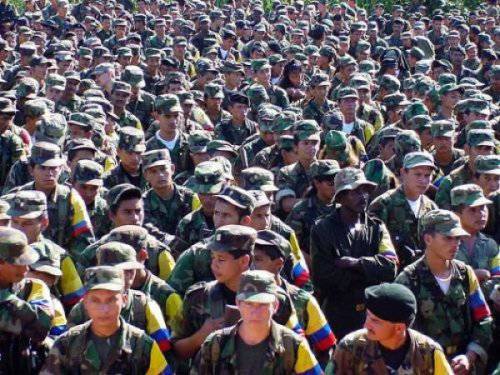
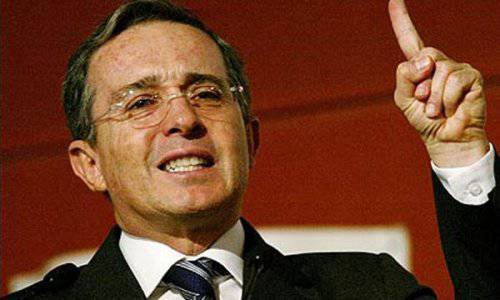
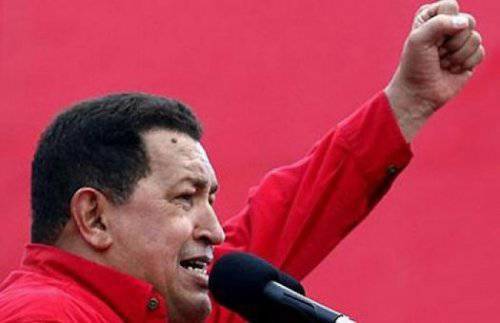
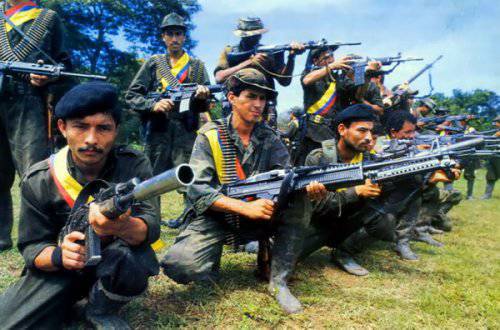
Information